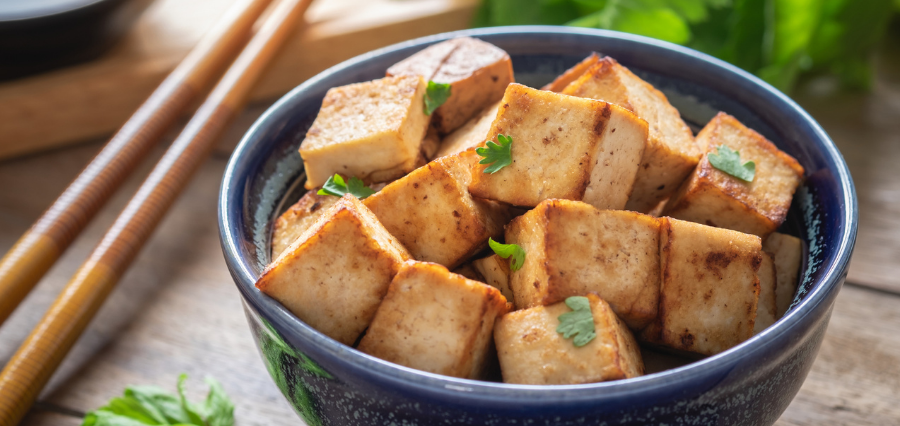Does Tofu Lower Cholesterol?

Understanding foods, such as tofu, can help you achieve your health goals more quickly, without frustration. Here’s why health experts say tofu could help.
What is Tofu?
Made from soybeans, tofu is sometimes called soybean curd. Tofu can be found in various forms, making it easy to use in your favorite recipes:
- silken for smoothies
- soft for scramble egg substitute
- firm for a tandoori stir fry
- extra firm as crispy cubes, or a casserole
Is Soy Good for Lowering Cholesterol?
Not all soy is created equally. Tofu is not the same as processed soy products. Kara explains, “Tofu is a whole food – which is important to note, opposed to processed soy products such as soy sauce and soybean oil”. It can be confusing as some processed soy product labels have health claims relating to a reduced risk of cardiovascular disease. “Tofu is a good source of protein, fiber, and omega-3 fatty acids,” adds Kara. Scientific evidence suggests the best way to eat soy to lower cholesterol and to benefit your heart is to consume soybeans in their whole food forms, such as edamame beans or tofu, not processed soy products.
Is Soy Protein Good for Cholesterol?
Research has uncovered that soy protein can lower cholesterol and improve endothelial function (the lining of blood vessels that control blood pressure and flow). Yet, both research and Registered Dieticians recommend eating soy in its whole food forms, such as tofu or edamame. Here’s why…
5 Science-Backed Ways Soy (Tofu) Could Improve Your Health
- Improve blood pressure
- Lower inflammation
- Blood sugar improvement
- Promotes healthier body weight
- Lowers cholesterol (LDL and total)
What’s Bad About Soy Products?
Processed soy products do not offer the same nutrients as tofu. As such, it’s no surprise that newer research has found different soy foods have varying protective effects. In Asian populations where whole soy and traditional soy-based foods (tofu, natto) are consumed, there are lower incidences of chronic diseases (heart disease, obesity, and diabetes). Yet, in Western populations where various processed soy products are consumed, studies don’t see these benefits.
Eating whole soy foods, such as tofu, offers an abundance of nutrients, including proteins, antioxidants, and fibers. Antioxidants reduce inflammation, which plays a role in heart disease. Plant fibers help by nourishing the microbes in the gut, which in turn create acids that promote healthier blood cholesterol levels, says science.
5 Things in Tofu that Helps Lower Cholesterol
Eating soy in its whole and traditional soy-food forms, such as tofu offers greater heart health benefits, suggests research:
- Plant sterols (help block cholesterol from being absorbed in the gut)
- Antioxidants/Isoflavones (lower blood LDL cholesterol levels in studies)
- Lecithins (plant oils that improve both HDL and LDL cholesterol)
- Soluble fibers (help trap cholesterol in the gut for elimination)
- Proteins (improve LDL cholesterol regulation)

Learn More About Pritikin
Is Soy Good for Men?
Tofu contains isoflavones which beneficially affect estrogen receptors in women, offering needed protective effects as estrogen concentrations deplete after menopause and incidence of cardiovascular disease increase sharply. For men, eating soy does not impact hormones in men. Evidence from clinical studies shows soy isoflavones do not impact testosterone or estrogen in men.
You can overcome barriers, including confusion about what you should eat, and reach your health goals with the help of Registered Dieticians like Kara, and award-winning chefs at the Pritikin Center.
What’s the Best Food to Eat to Lower Cholesterol?
No one food will lower cholesterol, nor is simply taking medication enough, according to science. But, as Kara explains, “Every small change makes a difference!” Growing evidence suggests plant-based proteins, such as tofu, can improve blood cholesterol levels. “Next time you are in the mood for a stir-fry, experiment with some firm tofu and see your heart smile!”
Focus on plants and lower your intake of animal-based products if you want to lower cholesterol levels and reduce the risk of heart disease – it’s been proven in over 100 clinical studies at the Pritikin Center to work.
How to Lower Your Cholesterol for Good
Escape to the renowned Pritikin Center. Immerse in this clinically proven heart-healthy environment, in a tropical enclave, surrounded by luxurious accommodations and amenities.
Throughout your stay, you will be supported by physicians, a team of Registered Dieticians, chefs, fitness experts, and lifestyle change experts. You will leave with the strategies and confidence you need to live healthier at home.

Get All the Details of a Stay at the Pritikin Center in Your Inbox
References
- Effects of plant protein and animal protein on lipid profile, body weight and body mass index on patients with hypercholesterolemia: a systematic review and meta-analysis. Acta Diabetol 2020 Oct;57(10):1169-1180.
- Beyond the cholesterol-lowering effect of soy protein: a review of the effects of dietary soy and its constituents on risk factors for cardiovascular disease. Nutrients 2017 Apr; 9(4): 324.
- The role of gut microbiota on cholesterol metabolism in atherosclerosis. Int J Mol Sci 2021 Aug; 22(15): 8074.
- Soy isoflavones lower serum total and LDL cholesterol in humans: a meta-analysis of 11 randomized controlled trials. Am J Clin Nutr 2007 Apr; 86(3):809.
- Plant sterols and plant stanols in the management of dyslipidaemia and prevention of cardiovascular disease. Atherosclerosis 2014 Feb; 232(2): 346-60.